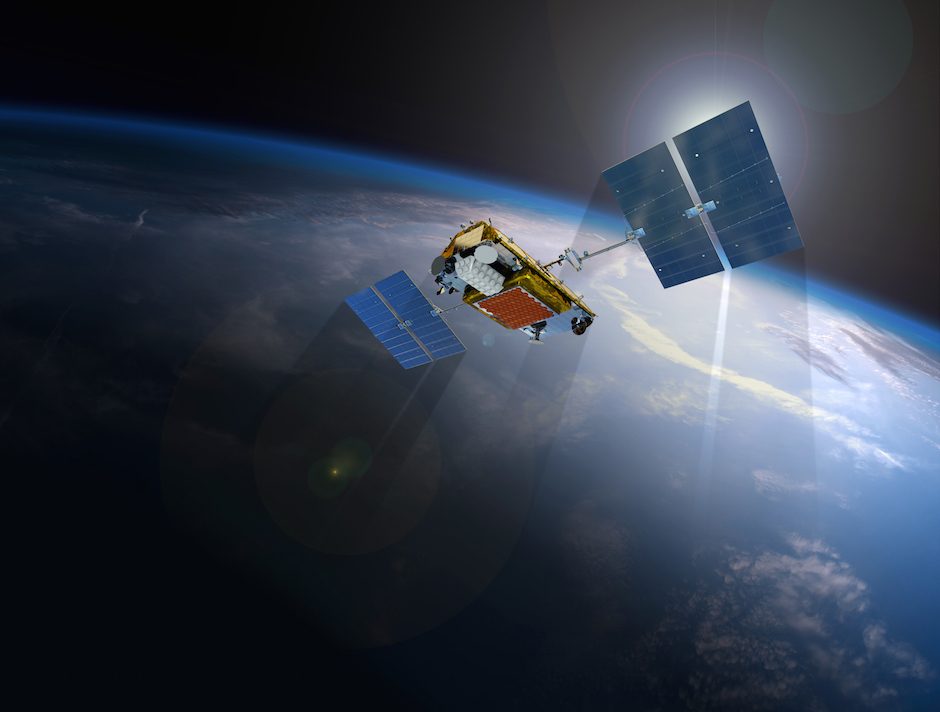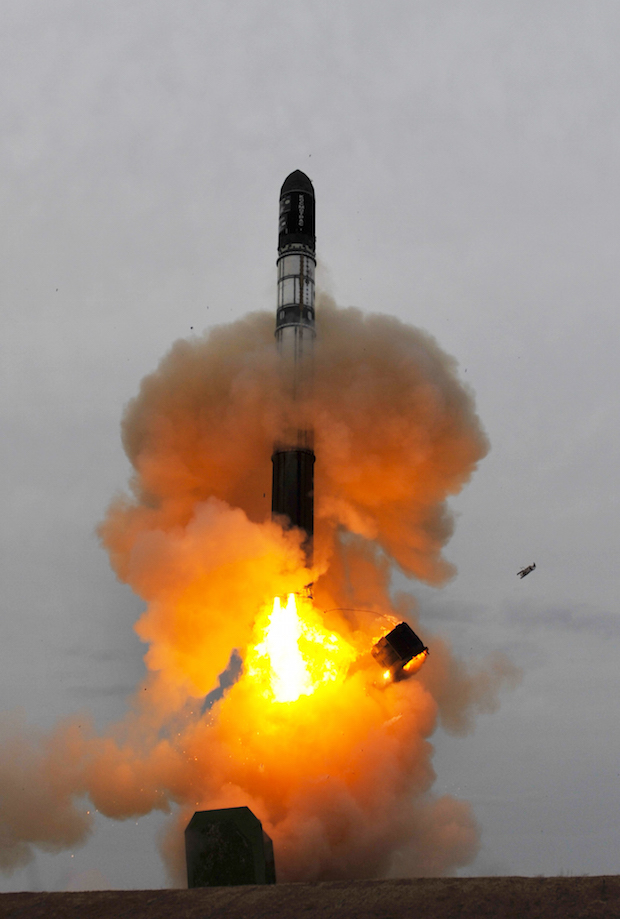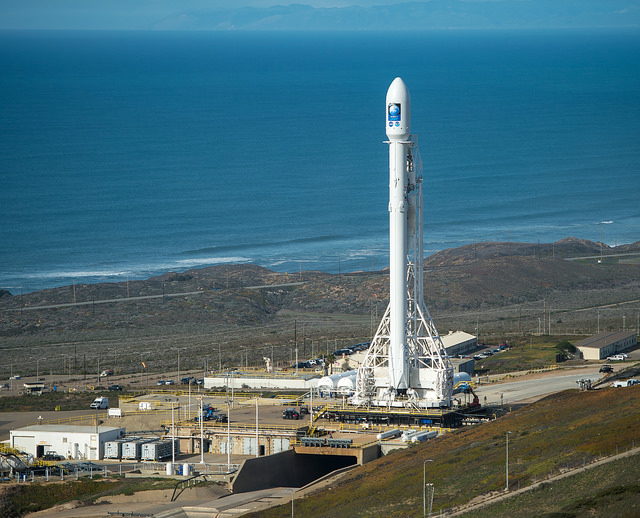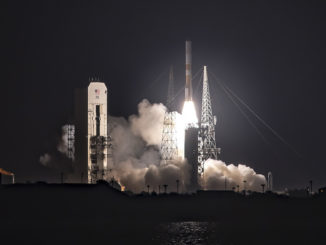
Stymied by Russian government dithering that has indefinitely grounded a test launch on a modified Soviet-era missile, Iridium officials say that SpaceX agreed to move forward to July the first of seven Falcon 9 launches from California with the company’s next-generation mobile communications satellites.
Iridium originally planned to start launching the Iridium Next satellite fleet before the end of 2015 with the liftoff of two pathfinder spacecraft on a Dnepr rocket from Russia.
But a faulty component in each satellite’s Ka-band communications payload had to be replaced last year, delaying the first Iridium Next launch aboard Dnepr until April.
Iridium chief executive Matt Desch said Thursday that the Dnepr rocket’s provider, Moscow-based ISC Kosmotras, has not received approval from Russian government for the launch from the Dombarovsky military base near Yasny, Russia.
“Unfortunately, Kosmotras informed us that they have not yet received the necessary approvals from the Russian Ministry of Defense, one of the final steps required to launch our satellites from Yasny,” Desch said Thursday in a conference call with investment analysts.
“Administrative paperwork was submitted to the MoD sometime ago, and Kosmotras has been unable to get any feedback on the timeline for sign-off,” Desch said. “This is very disappointing as our satellites will be ready, and the space head module that holds the satellites on the rocket is complete and already delivered to the Yasny launch site.”
Iridium officials said the paperwork problem has effectively grounded the first launch of the $3 billion Iridium Next program, which aims to replace all of the company’s existing low Earth orbit satellites mostly launched in the late 1990s and early 2000s.
With nearly 800,000 billable subscribers, Iridium’s network connects users with handheld satellite-capable telephones, such as travelers, media companies, oil and gas operators and the U.S. military. The company’s products also relay machine-to-machine messages around the world.
The Iridium Next fleet will orbit about 485 miles (780 kilometers) above Earth on paths taking them over the poles to enable global coverage. The constellation will consist of 81 satellites, including ground spares.

The mobile communications firm has a contract with SpaceX for seven launches of the Falcon 9 rocket to carry up 10 Iridium Next satellites at a time. The first of the lot was supposed to go up in August from Vandenberg Air Force Base, California.
Desch said SpaceX has agreed to move up the launch to July to help keep the Iridium Next program on schedule.
“Kosmotras will continue to work on obtaining approvals, but we’ll not jeopardize the timeline for the Iridium Next program,” Desch said Thursday. “Our first launch has now been confirmed for a SpaceX Falcon 9, and we’ll consider scheduling the Dnepr launch at a later time when Kosmotras is ready.
“We are fortunate to be working with SpaceX as our primary launch provider as they have been very flexible and have agreed to pull forward our initial SpaceX launch from August to July as the satellites for the launch will be ready to ship to Vandenberg in June,” Desch said. “This will have the effect of moving our first launch out by three months from April on Dnepr to July on SpaceX.”
Tom Fitzpatrick, Iridium’s chief financial officer, said the company will incur some extra insurance costs with the change in launch schedule.
Iridium has secured more than 90 percent of its launch and satellite insurance for the first two SpaceX flights, but Fitzpatrick said the Iridium Next’s total insurance costs will “immaterially” exceed the $125 million mark the company previously forecast.
That is driven by Iridium’s new strategy of launching 10 newly-designed satellites on the first mission, instead of two, officials said.
Iridium and its satellite manufacturer, Thales Alenia Space, intended to use the two satellites launched by Dnepr as in-orbit testbeds. Engineers planned to run the spacecraft through comprehensive checkouts, verifying their functionality before approving the launches of follow-on satellites in batches of ten.

The Russian government has also withheld approval for the launch of a Spanish Earth observation satellite named Paz, which was to blast off aboard a Dnepr before the Iridium Next payloads.
The Spanish newspaper El Pais reported in December that a secret decree by Russian President Vladimir Putin last year halted launches of the Dnepr rocket, which is based on the Soviet-era R-36M missile made in Ukraine.
A spokesperson for Hisdesat, the owner of the Paz satellite, did not confirm the El Pais report, but said the company has not been notified of a firm launch date for the delayed mission.
The R-36M is also known by its Western designation, the SS-18 “Satan.”
Kosmotras, which has joint Russian-Ukrainian ownership, sells modified versions of stockpiled silo-launched R-36M missiles to international satellite owners for flights into Earth orbit.
The future of the Dnepr program has been questioned by analysts and external groups since Russia’s annexation of Crimea in 2014, and the outbreak of civil war in eastern Ukraine. But the launches continued until early 2015, when the most recent Dnepr mission lofted a South Korean reconnaissance satellite named Kompsat 3A.
Iridium’s original contract with SpaceX, signed in 2010 and then proclaimed as the most valuable commercial launch deal to date, covered eight Falcon 9 flights, each with nine satellites, according to Desch.
With upgrades to the Falcon 9 rocket introduced since 2010, SpaceX’s rocket can now haul 10 satellites per flight, prompting Iridium to modify its contract for one fewer Falcon 9 launch. The McLean, Virginia-based mobile telecom company purchased a Dnepr rocket to launch the two remaining Iridium satellites after restructuring the SpaceX contract.
SpaceX’s second flight for Iridium is set for October, followed by Falcon 9 launches from California every two months into 2017, according to Desch.
Iridium requires regular and predictable launches to fully populate the Iridium Next network with satellites, and Desch appeared confident in SpaceX’s ability to fly its jam-packed manifest, which is months behind schedule after a launch failure last year.
The Iridium launch cadence allows three months for ground controllers to test the performance of the next-generation satellites, instead of the four-month test campaign originally planned after the Dnepr launch.
Desch said Thales Alenia Space and Orbital ATK, the Iridium Next satellites’ final assembly contractor, currently have 12 spacecraft in manufacturing. Orbital ATK’s facility in Arizona will produce six of the 1,896-pound (860-kilogram) satellites per month by July, he said.
Qualification of the first two Iridium Next satellites should be completed in March.
“Clearly, changing our launch plan is not the news we expected to be sharing so close to our April launch date,” Desch said. “However, we have responded quickly to the events as they unfolded and put in place the solid plan on which we can execute the overall program, (which is) on track for completion in 2017.”
Email the author.
Follow Stephen Clark on Twitter: @StephenClark1.



